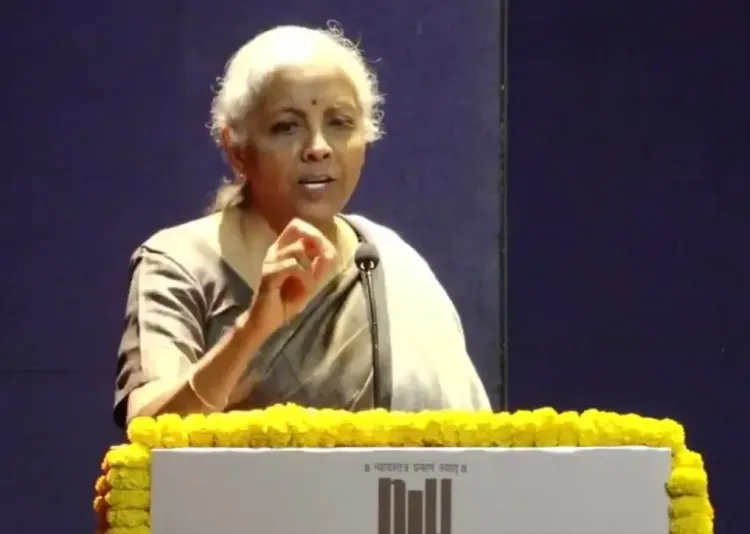Bilateral Investment Treaties Should Safeguard National Interests: FM Sitharaman

Synopsis
Key Takeaways
- Bilateral investment treaties (BITs) must prioritize national interests.
- Arbitrators should be guided by judicial decisions of host nations.
- BIT negotiations should occur independently of Free Trade Agreements.
- Investment treaties impact the sovereignty of developing countries.
- Investor-State Dispute Settlement cases can impose heavy burdens on nations.
New Delhi, Feb 16 (NationPress) Finance Minister Nirmala Sitharaman has emphasized the importance of bilateral investment treaties (BITs) in addressing national interests concerning regulatory authority and providing direction to arbitrators during dispute resolution. This is crucial to prevent wealthy investors from taking advantage of developing nations.
During the launch of the inaugural PG Certificate Course on International Commercial & Investment Treaty Arbitration, Sitharaman noted that arbitrators frequently overlook judicial decisions made by the host nation. She stated that in arbitration outcomes, even findings related to serious offenses such as fraud and corruption recognized by the host country's legal system can place the states in a challenging position regarding award acceptance.
“An investment treaty should not only enhance nations' regulatory authority but also guide arbitrators in restoring confidence in arbitration. I firmly believe that moving forward, the investment treaties must encompass: - National interests regarding regulatory authority - Enhanced guidance for arbitrators in dispute resolution, considering nations' interests and unique circumstances,” Sitharaman asserted.
She underscored that issues surrounding a Bilateral Investment Treaty (BIT) are specific to the sovereign, suggesting that BIT negotiations should occur independently rather than as part of a Free Trade Agreement (FTA).
The Finance Minister’s remarks come as India is in the process of negotiating BITs with the UK, Saudi Arabia, Qatar, and the European Union (EU).
The Government's Budget for 2025-26 has proposed a revamp of the existing model BIT to create a more investor-friendly environment and attract foreign investment.
Referencing UNCTAD reports, Sitharaman indicated that there have been 1,368 registered cases of investment treaties. Alarmingly, approximately 70 percent of these cases are directed at developing countries under outdated treaties, which poses a significant concern for these nations. This situation permits investors to maliciously exploit advantages.
Some financially robust entities purchase cases from arbitration parties and prolong the process, which no sovereign state can withstand across various jurisdictions. Ultimately, the party with greater financial resources often prevails. While this is not the case for every situation, Sitharaman cited numerous anecdotal instances from developing countries.
Investors typically seek an average of $1.1 billion in Investor-State Dispute Settlement (ISDS) cases, imposing a notable burden on the Global South.
According to Sitharaman, corporations have leveraged ISDS mechanisms through investment treaties to contest government regulations, environmental policies, and public interest laws.
She asserted the significance of BIT and its implications for the country’s sovereignty, highlighting the necessity of having a dedicated BIT with experts in taxation law and policy.









